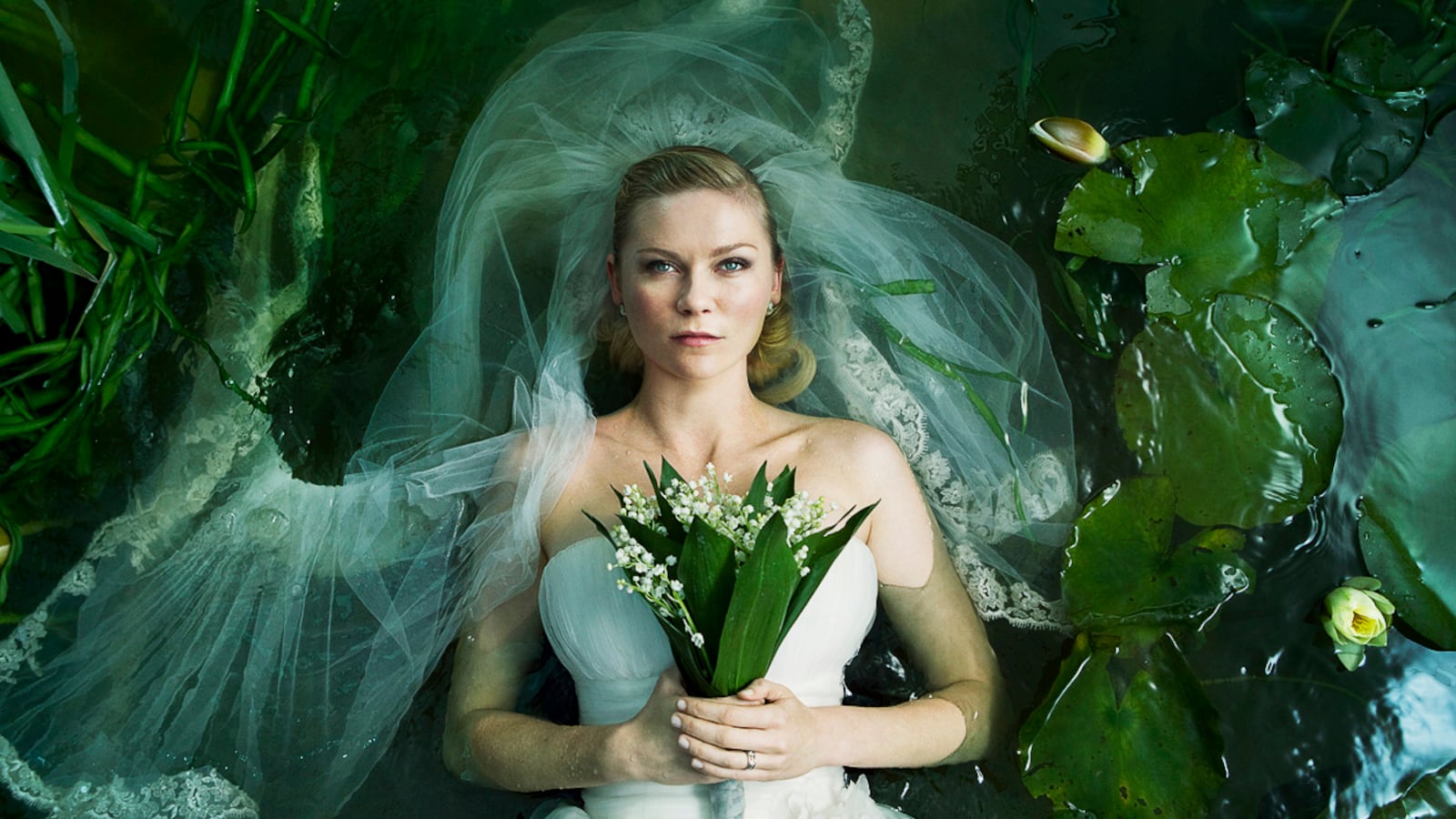The first half of Melancholia, the new film by controversial Danish director Lars von Trier depicts the saddest wedding in the world, a weekend in the country where all attempts at joyfulness are suffocated by a heavy cloud of gloom, largely emanating from the bride, played by Kirsten Dunst. In the second half, Dunst’s character rejoices as a planet approaches to destroy Earth and everyone on it.
If the film itself is a bit dark, its publicity campaign has been even edgier—accidentally. The worldwide tour started out with director Von Trier being ejected from the Cannes Film Festival after jesting about having positive feelings for Nazis.
Despite this backdrop, Kirsten Dunst radiates excitement when she comes to talk about Melancholia. And why shouldn’t she? Difficult though Melancholia may be, it is in the minds of many the most interesting film to come along in years, one certain to top many end-of-the-year Best Of lists. Nearly every frame of the film is built around Dunst’s character, Justine, the saddest bride in history. It is the sort of part an actress dreams of, and Dunst gives what is clearly the performance of her career, creating a human puzzle that viewers will be trying to solve for years.
So despite the bumps in the road, and despite the deeply depressing film, Dunst’s exuberance overflows as she talks about the film while sipping lemonade on the sunny patio of West Hollywood’s Tower Bar. “This sort of part is just a rarity,” she said. “These auteurs who write and direct don’t make that many films, and when they do it usually is built around a male part. It’s so rarely around a female part.”
Dunst, 29, has already had a very long career since she first caught the public eye at age 12 in Interview With the Vampire. But despite working with many of Hollywood’s great directors, she has hovered just off the margins. Other than in the Spider-Man movies, her roles have always been too indie (the great Dick), or the films have just missed (Elizabethtown, Wimbledon). She has never turned in anything less than a very solid performance, she was never less than memorable, but hadn’t yet found that one role that closes the door for all time on questions of how good an actress is.

No one who sees Melancholia can deny that that role has arrived for Dunst. Were there any justice in the Oscar race, the part would give be a lock for a Best Actress nomination and a strong contender to win the trophy. As it is, Dunst enters the most crowded category in this year’s race: The Help’s Viola Davis, Meryl Streep as Margaret Thatcher in The Iron Lady, and Michelle Williams as Marilyn Monroe in My Week With Marilyn are all considered locks, with everyone else (Rooney Mara, Elizabeth Olsen, Charlize Theron, Glenn Close, and more) fighting for the fourth and fifth spots.
Yet none of those performances is likely to come near the wholly original work that Dunst did in Melancholia, and the fact that she must fight it out for the two remaining slots with a half dozen other possible contenders only demonstrates the extent to which gimmickry has often risen above art in the acting races of late.
Chatting with Dunst, however, illuminates what a unique journey she went on to create a character like Justine in a film as astounding as Melancholia.
Before arriving on the set—an estate in a remote Danish village where she and the crew would camp out for a month and a half—Dunst took several weeks preparing to confront the morose character she was to play. She trained for Justine like a prizefighter trains for an opponent, studying her every decision from inside out. “I work with somebody, and we do extensive preparations. I went on vacation and she came with me. We spent day after day on it. It feels like I’m going to therapy. Sometimes we deal with imagery. Sometimes I work with my dreams as well. What it does for me is it really creates an inner life for the character that I really understand and that I know better than anyone else. My script pages are covered with notes. I created an emotional bible for myself. It gives me confidence when I go to the set. I refer to it before I do every scene. And then when you film out of order, it makes my performance make sense.”
Only in the film’s second half, when Justine becomes certain that the planet and all its inhabitants are doomed, does she find her peace and contentment. Needless to say, it’s not Mary Poppins. But it’s a part perfect for Dunst, who, more than any actress today has the ability in her work to move effortlessly between the poles of effervescence and sadness. If there is a performer who seems to have the emotional capacity to star in a film entitled Melancholia, it is Dunst.
A few years ago, Dunst admitted to seeking treatment for depression. While she says that experience informed her work in this movie, it is, ironically, only because she has come through to the other side that she felt she had the strength to play a character with as many dark shades as Justine.
“Every movie I do I always use things that have happened in my life. Funny moments, anything. If it just sticks out I’ll write it down and use that, too, because it has to come out of you. But no one can work when they’re depressed. I don’t think I’d physically be able to do it if I were depressed.”
Dunst told of how she came to understand her tormented heroine, coming to a decision about her character’s special history with Melancholia, the planet that in the film is on a course to destroy Earth. “She’s trying to live this fantasy normal life. I think maybe Justine has a lover somewhere. I thought about Tristan and Isolde [music that is repeatedly used in the film] and thought maybe the reason this music is always playing is because she has this long lost love somewhere, who died or something. And then her relationship with the planet, for me, was she came from that planet.”
“It’s so funny,” she continued, “I wouldn’t say those things to Lars. I don’t think I ever said that to him. If you try and talk to him about what the film is about, he’ll just make a joke. Any questions we had for him he wouldn’t really answer.”
To call Lars von Trier controversial is like saying Pope Benedict dabbles in religion.
Throughout his career, he has courted controversy at every turn and sent many who worked with him running for the exits in horror. He is a man who lives to poke at the public’s every delicate sensibility and to trample over any forbidden boundaries. His most flagrant episode came, however, last spring at the Cannes Film Festival. While sitting next to Dunst on a podium answering journalists’ questions about Melancholia, he mused, apropos of nothing much, “I understand Hitler,” and “I’m a Nazi.” (He later duly apologized, then took back the apology, and has since pledged never to do an interview again.)
For Dunst, however, the scourge of the international film scene was not only a delight to work with but also a teddy bear in need of a hug who created a real family on the set. “He’s an eccentric personality. I’m a pretty go-with-the-flow person, but it took me a few dinners to get to know Lars and not be offended by certain things. He can be a little pervy sometimes. Lars is the kind of guy who—I remember eating dinner with some of the other cast members and Lars’s assistant comes and says, ‘Lars really wants to talk to you.’ And I said, ‘What?’ Because sometimes his moods are very sensitive so you don’t know how its going to be, although Charlotte [Gainsbourg] would tell me, ‘He’s in a really good place on this film.’
“So I walked in, and he said, ‘I need you to play this video game with me.’ That’s Lars. He played Evil Dead with me. That was so far into the shoot that we were bros. He’s my friend. I’ll text him all the time. And he’s so kind. He’s a very caring, he has a big heart.”
She continued, “Lars hates acting. It’s his pet peeve. He would yell, ‘Stop acting!’ Or I remember him yelling at Udo [Kier, who plays the film’s wedding planner], ‘More gay! Too gay!’ It’s a set like that, too. There’s a lightheartedness. Lars permeates his own energy and sets a tone for everyone else, too. It’s almost like he is an actor along with us sometimes. Because he’s so emotionally available and he is so emotionally involved. He wears all his emotions on his face, and you see him walking around and you know everything he’s feeling at all times. I think that’s why he has so many women around him in powerful positions, his costume designer, his set decorator, his producer are all women for the most part. He likes to be around women and to be nurtured. I was always, like, ‘It’s OK, Lars.’ He needs hugs. He’s a very lovey dovey man.”
Von Trier, who began as an advocate of the radical naturalistic Dogme 95 school of filmmaking, now embraces many conventional tools (such as soundtracks), but retains on his sets a method to keep the shoots as unstage-y as possible. “Lars is someone who doesn’t like to talk about things. And we didn’t rehearse. We would do a little bit of improvising, but I think it was just for him to start to see the essence of how everyone was going to be with each other before we started filming. If it were a scene between you and I when we had to walk into a restaurant and have a conversation, we could sit anywhere we want and the camera would just follow us. It’s very exciting to work in.”
The jolly atmosphere on the isolated set seems totally at odds with not only the reputation of the terror of Cannes, but with the film’s subject matter, which makes all other attempts at indie bleakness look like Saved By the Bell. But for Dunst, looking back on her time at Camp Lars and creating the performance of her lifetime brings back nothing but happy memories. Even thinking of the film’s unbelievable, beyond-dark finale brings a smile to her face. “The end of the movie, it’s so cool, I just think it's mind-blowing. When I saw it for the first time all together, I just busted out laughing.”





